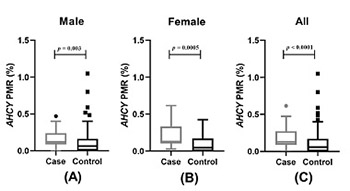DNA methylation of AHCY may increase the risk of ischemic stroke
DOI:
https://doi.org/10.17305/bjbms.2020.4535Keywords:
Ischemic stroke, DNA methylation, S-adenosylhomocysteine hydrolase, sex, ageAbstract
Genetic factors play an important role in the pathogenesis of ischemic stroke. Of these, epigenetic modifications provide a new direction for the study of ischemic stroke pathogenesis. This study aimed to determine the correlation between DNA methylation of the gene encoding S-adenosylhomocysteine hydrolase (AHCY) and the risk of ischemic stroke in 64 ischemic stroke patients and 138 patients with traumatic brain injury (control group). The methylation level of AHCY was analyzed using quantitative methylation-specific polymerase chain reaction. Statistically significant differences in AHCY methylation levels were observed between the case group [medians (interquartile range): 0.13% (0.09%, 0.27%)] and the control group [0.06% (0.00%, 0.17%), p < 0.0001], and these associations remained significant in both male (p = 0.003) and female (p = 0.0005) subjects. A subgroup analysis by age revealed a considerably higher percentage of methylated AHCY in the case group than the control group in all age groups (age < 60 years, p = 0.007; age ≥ 60 years, p < 0.0001). A receiver operating characteristic (ROC) curve analysis revealed a trend toward a role for AHCY methylation as an indicator of risk in all ischemic patients [area under the curve (AUC) = 0.70, p = 0.0001], male patients (AUC = 0.67, p = 0.004), and female patients (AUC = 0.75, p = 0.0002). Our study confirmed a significant association between the AHCY DNA methylation level and the risk of ischemic stroke, suggesting that this gene methylation pattern may be a potential diagnostic marker of ischemic stroke.
Citations
Downloads

Downloads
Additional Files
Published
How to Cite
Accepted 2019-12-30
Published 2020-11-02









